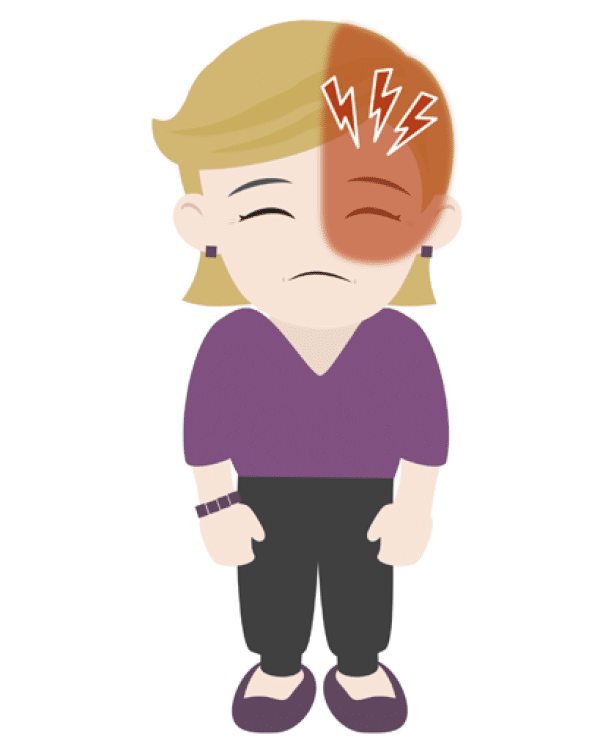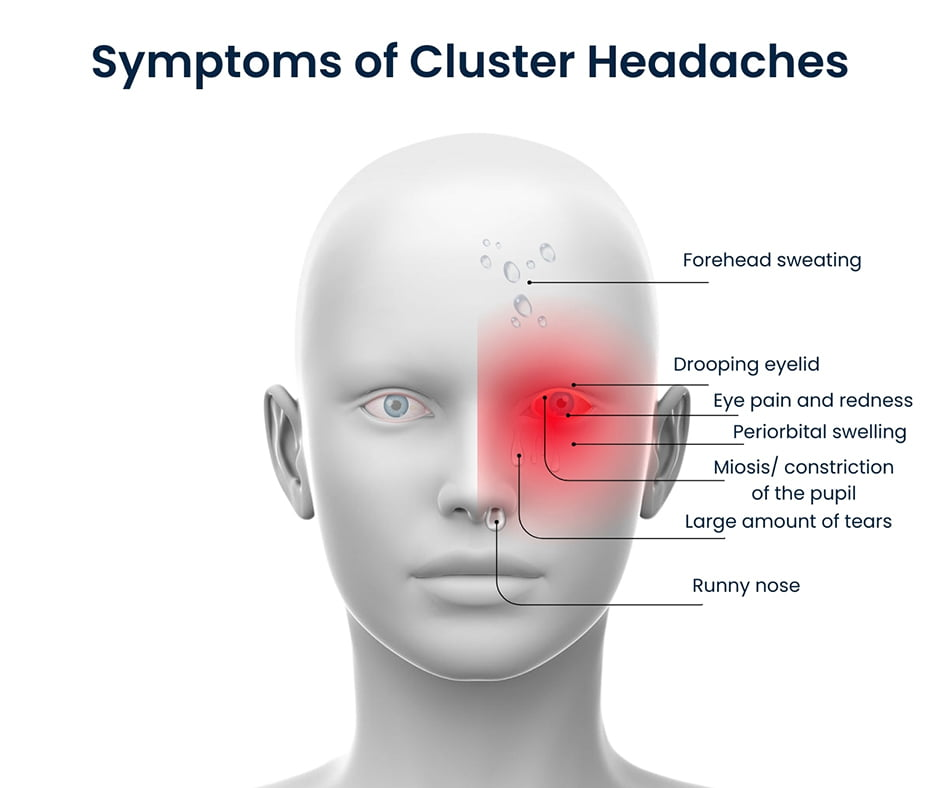Mitigate Pain Clinic – Dr Jeshnu Tople – Pain Management Specialist In Nagpur
Headache
Headache

Types of Headaches
Headaches are classified into two main categories:
Primary Headaches: These are not caused by an underlying medical condition and include:
Migraine: Characterized by intense, throbbing pain, often accompanied by nausea, light sensitivity, and aura.
Tension Headaches: The most common type, causing a constant, dull ache or pressure around the head.
Cluster Headaches: Severe, recurring headaches that typically affect one side of the head and occur in cycles.
Secondary Headaches: These result from an underlying issue, such as infection, injury, or other medical conditions like high blood pressure.
At Mitigate Pain Clinic, we have extensive experience diagnosing and treating headaches, using advanced interventional techniques to offer relief.
Causes of Headaches
Headaches can be triggered by a variety of factors, depending on the type. Common causes include:
Lifestyle Factors: Stress, lack of sleep, poor posture, dehydration, and certain foods can trigger headaches.
Medical Conditions: Sinus infections, high blood pressure, and neurological disorders may lead to headaches.
Genetic Factors: Migraines and other headaches often run in families, suggesting a genetic component.
Understanding the root cause of a headache is essential to developing an effective treatment plan. Mitigate Pain Clinic takes a comprehensive approach to identifying these triggers and creating a targeted intervention strategy.
Symptoms of Different Headache Types
Different headaches present with unique symptoms, which can help determine the best treatment approach:
Migraine: Often described as intense, throbbing pain, usually but not necessarily on one side of the head. Symptoms include nausea, vomiting, sensitivity to light (photophobia) and sound (phonophobia). Some individuals experience visual disturbances known as aura before the onset of pain.

- Tension Headaches: This type of headache is characterized by a dull, aching sensation around the forehead or the back of the head. Unlike migraines, tension headaches do not usually cause nausea or sensitivity to light.

- Cluster Headaches: These are excruciating headaches that occur in cyclical patterns or clusters. They often cause pain around one eye or one side of the head, along with tearing, nasal congestion, and restlessness.
Recognizing the symptoms and correctly diagnosing the type of headache is critical for effective pain management. At Mitigate Pain Clinic, our experts use a patient’s detailed history and symptoms to develop the most appropriate treatment plan.

Diagnosis of Headaches
Diagnosing headaches often involves reviewing a patient’s medical history, symptom patterns and potential triggers. Diagnostic methods may include:
Physical Examination: A thorough assessment to rule out other causes of head pain.
Imaging Tests: MRI or CT scans may be recommended if a secondary headache is suspected, especially in cases involving injury or unexplained symptoms.
Blood Tests: May be required sometimes to rule out infections or hormonal imbalances that could be causing headaches.
Impact of Chronic Headaches on Quality of Life
Chronic headaches, especially migraines and cluster headaches, can have a profound impact on daily life. The physical pain, along with the emotional and social toll, can be overwhelming. Some common effects include:
Workplace Issues: Frequent headaches can lead to missed workdays and decreased productivity.
Social Withdrawal: Persistent pain can cause individuals to avoid social gatherings and activities.
Mental Health Strain: Anxiety, depression and stress often accompany chronic headaches, creating a vicious cycle of pain and emotional distress.
At Mitigate Pain Clinic, we understand these challenges and are dedicated to helping patients reclaim their lives through effective, targeted treatments.
Traditional Headache Treatments
Traditional treatments for headaches include:
Over-the-Counter Pain Relievers: Medications like ibuprofen, aspirin, and acetaminophen are commonly used to manage headache symptoms.
Prescription Medications: For migraines, triptans and other prescription drugs may be recommended to prevent or alleviate symptoms.
Lifestyle Adjustments: Stress management techniques, sleep hygiene, hydration, and dietary changes can help reduce headache frequency.
While these methods can provide relief for many people, chronic or severe headaches often require more advanced intervention.
Role of Interventional Pain Management in Headaches
For patients who do not respond to traditional treatments, interventional pain management offers a range of advanced techniques to target and alleviate headache pain. These procedures address the root causes of pain by targeting the nerves responsible for transmitting pain signals to the brain.
Interventional pain management involves minimally invasive treatments that can significantly reduce or eliminate chronic headache pain. At Mitigate Pain Clinic, we specialize in these cutting-edge techniques, helping patients achieve lasting relief.
Interventions for Headache Relief
Nerve blocks are a common and effective interventional treatment for headaches. These procedures involve injecting an anesthetic or steroid into specific nerves to block the transmission of pain signals. Some common nerve blocks for headaches include:
Occipital Nerve Block used for migraines and occipital neuralgia, this injection targets the occipital nerves at the base of the skull to relieve pain.

- Sphenopalatine Ganglion (SPG) Block: This block targets a group of nerves behind the nose and is often used for cluster headaches and migraines.
- Radiofrequency Ablation (RFA) is another interventional technique used to treat chronic headaches. This procedure uses heat generated by radiofrequency energy to target and disable specific nerves responsible for transmitting pain signals.
RFA is a safe, minimally invasive procedure that can provide longer-lasting relief compared to nerve blocks. Mitigate Pain Clinic offers RFA as part of a comprehensive treatment plan for patients suffering from chronic headaches. - Botox injections are FDA-approved for the treatment of chronic migraines. This treatment involves injecting botulinum toxin into specific areas of the head and neck to block the release of pain-causing chemicals. Botox is effective for patients who experience frequent migraines, offering relief for up to three months with each treatment.
At Mitigate Pain Clinic, Botox is used as part of our interventional pain management approach, helping patients reduce the frequency and intensity of their headaches.


Advanced Interventional Treatment for Headaches
For patients with severe or treatment-resistant headaches, Mitigate Pain Clinic offers advanced therapies, including:
Spinal Cord Stimulation (SCS): This therapy involves implanting a small device that delivers electrical impulses to the spinal cord, blocking pain signals before they reach the brain.
Occipital Nerve Stimulation (ONS): This therapy involves implanting a small device to stimulate the occipital nerves, providing long-term relief from chronic migraines and cluster headaches.
These therapies are reserved for patients who have not found relief through other methods. Our specialists carefully evaluate each patient to determine if these advanced options are appropriate.
The Role of Mitigate Pain Clinic in Headache Management
Personalized Treatment Plans at Mitigate Pain Clinic
FAQs About Headaches and Pain Management
Our Treatments
- Joint Pain
- Back Pain
- Sciatica Pain
- Neck Pain
- Hand Pain
- Shoulder Pain
- Foot & Ankle Pain
- Limb Pain
- CRPS Pain
- Cancer Pain
- Headache
- Hyperhidrosis
- Herpes Zoster Pain
- Chronic Pelvic Pain
- Scar Tenderness
- Postherpetic Neuralgia
- Trigeminal Neuralgia
- Peripheral Neuralgia
- Chronic Vascular Pain
- Generalised Body Pain
- Chronic Injury Pain
- Failed Back Surgery Syndrome
- Chronic Post Surgical Pain
- Other Painful Conditions
- Slipped DISC / PIVD